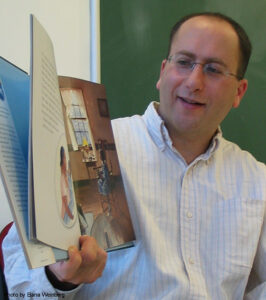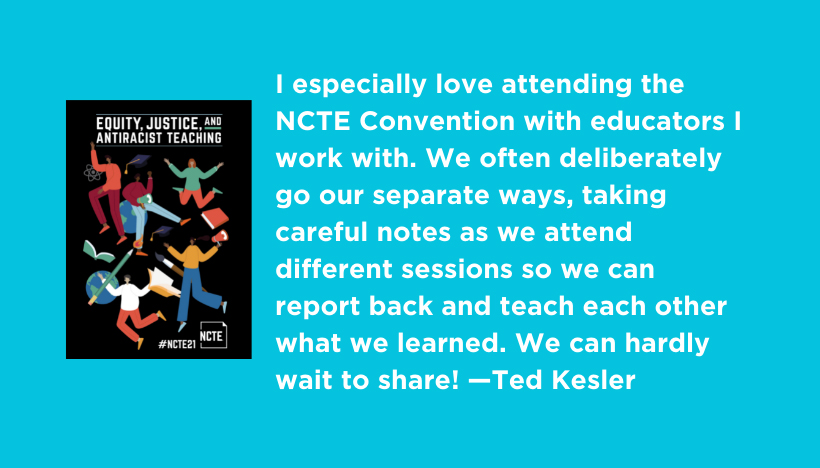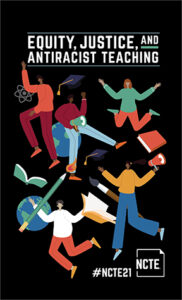This post was written by NCTE member Ted Kesler.
I love the clear imagery, the implied story, and ambiguity of William Carlos Williams’s classic poem “The Red Wheelbarrow.” So much of my professional life depends upon the NCTE Annual Convention. Each Convention provides clear imagery, implied stories, and ambiguity that contribute powerfully to my professional growth.
In 2014, I attended Tom Romano’s presentation on multigenre writing, which inspired the book I authored for classroom teachers, The Reader Response Notebook: Teaching Towards Agency, Autonomy, and Accountability (NCTE, 2018).
In 2016, I was privileged to present on “Using Poetry to Advocate for Teaching and Learning in the 21st Century” for the NCTE CEE Poetry Commission, which led to my blog post on using poetry to explore multidialecticism.
In 2017, I attended the NCRLL-sponsored session exploring racism in public education, which inspired my coauthored blog post highlighting the power of this session.
I especially love attending the NCTE Convention with educators I work with. We often deliberately go our separate ways, taking careful notes as we attend different sessions so we can report back and teach each other what we learned. We can hardly wait to share!
“I learned some concrete ideas for developing a curriculum of happiness for children.”
“Let’s consider implementing inquiry projects this year. We could do it even just one or two periods each week.”
“I heard some teachers present on the wonders and power of open cycles of writing workshop. Could we reserve one or two writing units of study for this?”
“I got some GREAT poetry ideas that I am so eager to try out with my students. I even wrote a poem during the session that I am so proud of.”
“I learned some new strategies for promoting student dialogic discussion in classrooms. I can present a workshop on it for the teachers.”
“I think we should make translanguaging a central focus of our professional learning this year. I went to a session that will give us a great start.”
And this last idea is what I mean by ambiguity: the ideas are unformed, in progress, still developing, propelling our lifelong learning, which strengthens our teaching.
Since the pandemic began, my NCTE network has continued to amaze me. This past year, I joined a poetry collective that includes some of my favorite children’s poets and educators. We were so inspired by our learning that we developed a roundtable session for #NCTE2021 that was accepted: “Poetry For Equitable, Humanizing, Participatory Practice.”As teachers and presenters, we are reminded that learning occurs in the process of doing. We learn as we collaborated on the proposal, as we shaped the focus for each roundtable, as we prepare specific content, as we prepare our digital presentations. We are reminded that, as we engage, we will make connections, spark new ideas, and feed our imaginations for new teaching and learning. We will perceive clear imagery, imply stories that continue unfolding, and bask in the glorious ambiguity of lifelong learners.
 Ted Kesler is associate professor in the Elementary and Early Childhood Education Department of Queens College, CUNY, where he directs the MAT preservice programs in elementary education. His research appears in numerous educational journals and he does educational consulting in schools and school districts around the country. Visit him at www.tedsclassroom.com, @tedsclassroom, and www.facebook.com/tedsclassroom.
Ted Kesler is associate professor in the Elementary and Early Childhood Education Department of Queens College, CUNY, where he directs the MAT preservice programs in elementary education. His research appears in numerous educational journals and he does educational consulting in schools and school districts around the country. Visit him at www.tedsclassroom.com, @tedsclassroom, and www.facebook.com/tedsclassroom.
It is the policy of NCTE in all publications, including the Literacy & NCTE blog, to provide a forum for the open discussion of ideas concerning the content and the teaching of English and the language arts. Publicity accorded to any particular point of view does not imply endorsement by the Executive Committee, the Board of Directors, the staff, or the membership at large, except in announcements of policy, where such endorsement is clearly specified.
Learn more and register for the
2021 NCTE Annual Convention,
November 18-21!


